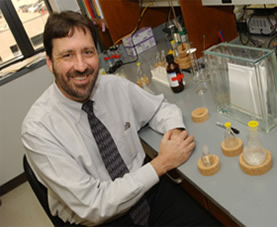Earlier this year, Dr. Jeffrey Conn, Director of the Vanderbilt Center for Neuroscience Drug Discovery, was presented an award by PhRMA at the Research and Hope Awards in Washington D.C. for his and his team’s efforts in research that discovered new approaches to the treatment of schizophrenia and major depression.
Every year, PhRMA hosts these awards to recognize the efforts of people that have made advances in various aspects of healthcare. At the Oct. 10th conference this year, the focus was on mental health and wellness.
“I was just really thrilled and honored because this is an unusual award as it is across the board,” Conn said.
Conn was the winner of the Excellence in Academic Research Award. This award was especially meaningful to Conn as PhRMA awarded him with his first grant to pursue research 30 years ago.
“I have always had a very strong appreciation for what they do and they have done a lot of good work in supporting research and they had a huge impact on my career so to see things kinda come full circle was really gratifying,” Conn said.
Conn’s research lead to the development of a new treatment for people with schizophrenia that works differently from current medication, which he said only treats the commonly recognized symptoms of the disease, such as hallucinations, delusions and paranoia. Conn’s treatment targets the other symptoms he says are not currently targeted by any medication, such as social withdrawal, lack of motivation and inability to experience pleasure as well as deficits in working memory and executive functions required to navigate daily life. This new treatment is expected to help some of the 30 percent of patients that current medications have no effect on.
Along with schizophrenia, this new discovery is also being used in the development of new treatments for major depression by targeting the cognitive impairment that is also present in these patients.
“Even major depression has a major component of cognitive impairment and it becomes this cycle so that if the person is experiencing major depression and due to whatever endogenous state their body [is in] and traumatic life events and stress [they experienced], that begins to impair their ability to function cognitively and then that cognitive impairment worsens the depression,” Conn said.
In conjunction with this project, Conn and his team are also working on a drug that can provide rapid benefits to those suffering from major depression as opposed to current antidepressants that can take up to 8 weeks to provide benefits and may not even have an effect on some patients.
Aside from the treatment of people with schizophrenia and those with major depression, this new breakthrough could also be used in the treatment for Parkinson’s and Alzheimer’s disease.
“We think those cognitive functions that are important [to understanding] the cognitive disturbances of schizophrenia are also really important for Alzheimer’s disease and other degenerative disorders where there are cognitive impairments,” Conn said.
Furthermore, Conn said the discovery might also be used in the treatment of other illnesses where cognitive function is impaired, such as Rett’s syndrome or autistic spectrum disorders. However, these potential impacts have yet to evaluated.
In the future, Conn hopes to apply this discovery to treatments of various mental illness in adults and children alike.
“Schizophrenia has been the first indication for us [that this works] and give hope that once these drugs are fully evaluated clinically that they can be tested in these other disorders as well,” Conn said.

